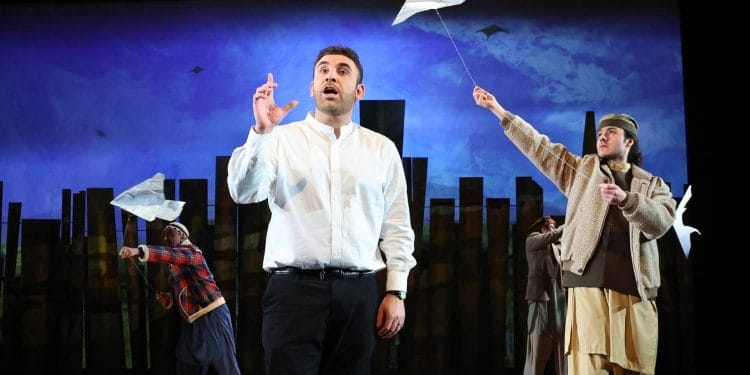 “That’s a sad story,” says Hassan. “Yes, but did you like it?” Amir responds. “Yes,” says Hassan, and so goes the play. The Kite Runner has made its way to Richmond Theatre, where it will be running until the 16th of March. The original book, by Khaled Hosseini, has been adapted by Mathew Spangler and directed by Giles Croft to produce a collaborative retelling that delves into friendship, identity, guilt, and redemption.
“That’s a sad story,” says Hassan. “Yes, but did you like it?” Amir responds. “Yes,” says Hassan, and so goes the play. The Kite Runner has made its way to Richmond Theatre, where it will be running until the 16th of March. The original book, by Khaled Hosseini, has been adapted by Mathew Spangler and directed by Giles Croft to produce a collaborative retelling that delves into friendship, identity, guilt, and redemption.
The play is set across Afghanistan and America as it follows the life of a young boy named Amir. It grapples with the tragic contexts of war and conflict in Afghanistan, spanning key periods of political turmoil from before the Soviet invasion through the Taliban rule to post-9/11. This brilliant and tragic story engrosses as it deals with both the personal and the political.
The play begins in Dari, one of Afghanistan’s official languages, grounding the story in its authentic cultural context before its shift to English. While I didn’t understand the initial dialogue between young Amir and Hassan, their playful expressions and gestures told me everything I needed to know. The universal language of children—playing—speaks volumes and transcends more than just language barriers as we watch the two boys, one Hazara and one Pashtun, exist together.
Adult actors playing children did wear thin on me pretty fast, as it extended over the whole first act. I found it somewhat distracting as the men on stage put on high-pitched voices, and ultimately, it diminished my immersion and emotional connection to the story.
Actor Bhavin Bhatt (Assef) did a brilliant job of making me absolutely despise his character. A particularly dark and twisted scene in Act 1 left me feeling sick to my stomach. Later, when Assef becomes a member of the Taliban, the audience gets a glimpse of his inner psyche with a monologue about the thrill of a massacre—it was both gripping and disturbing.
However, for such a tragic play with so much emotional substance, The Kite Runner did not affect me as much as it had the potential to. This was in part due to the overdone narration style. Some things were over-explained as Hassan constantly broke the fourth wall. I like to be able to work as an audience member, not have everything handed to me.
Act 2 developed in strength; it began with an exploration of refugees and transnational immigration, delving into Amir and his father’s struggle to settle and belong in America. Then, the play culminated in Amir’s physical journey back to Afghanistan in tandem with his personal journey towards redemption.
When Amir meets Hassan’s child, Sohrab, amidst the context of Taliban oppression, he says, “I want my old life back.” This single sentence struck me like a punch. All these children of war, of Afghanistan, of Ukraine, of Gaza. This moment had me reeling in both the historical and contemporary contexts of our time. Gut wrenching.
Despite my lack of emotional immersion at all times, The Kite Runner is strong and profound. There were moments of great acting, and it is no surprise that the book has been reshaped and moulded, as it is a story worth telling and retelling.
The Kite Runner, adapted by Matthew Spangler, directed by Giles Croft, is currently at Richmond Theatre, London, 12-16 March. Subsequent tour dates can be found here

















